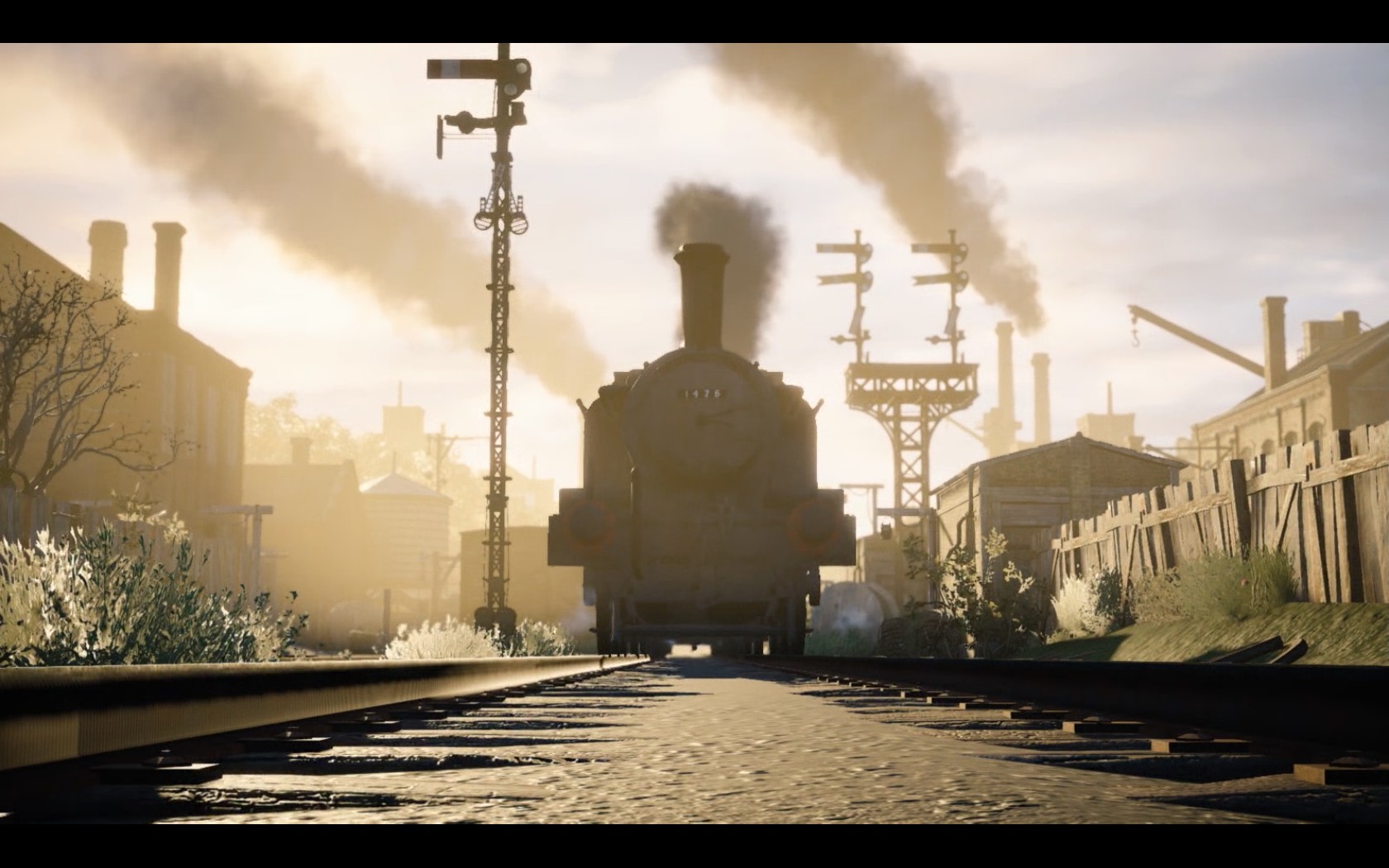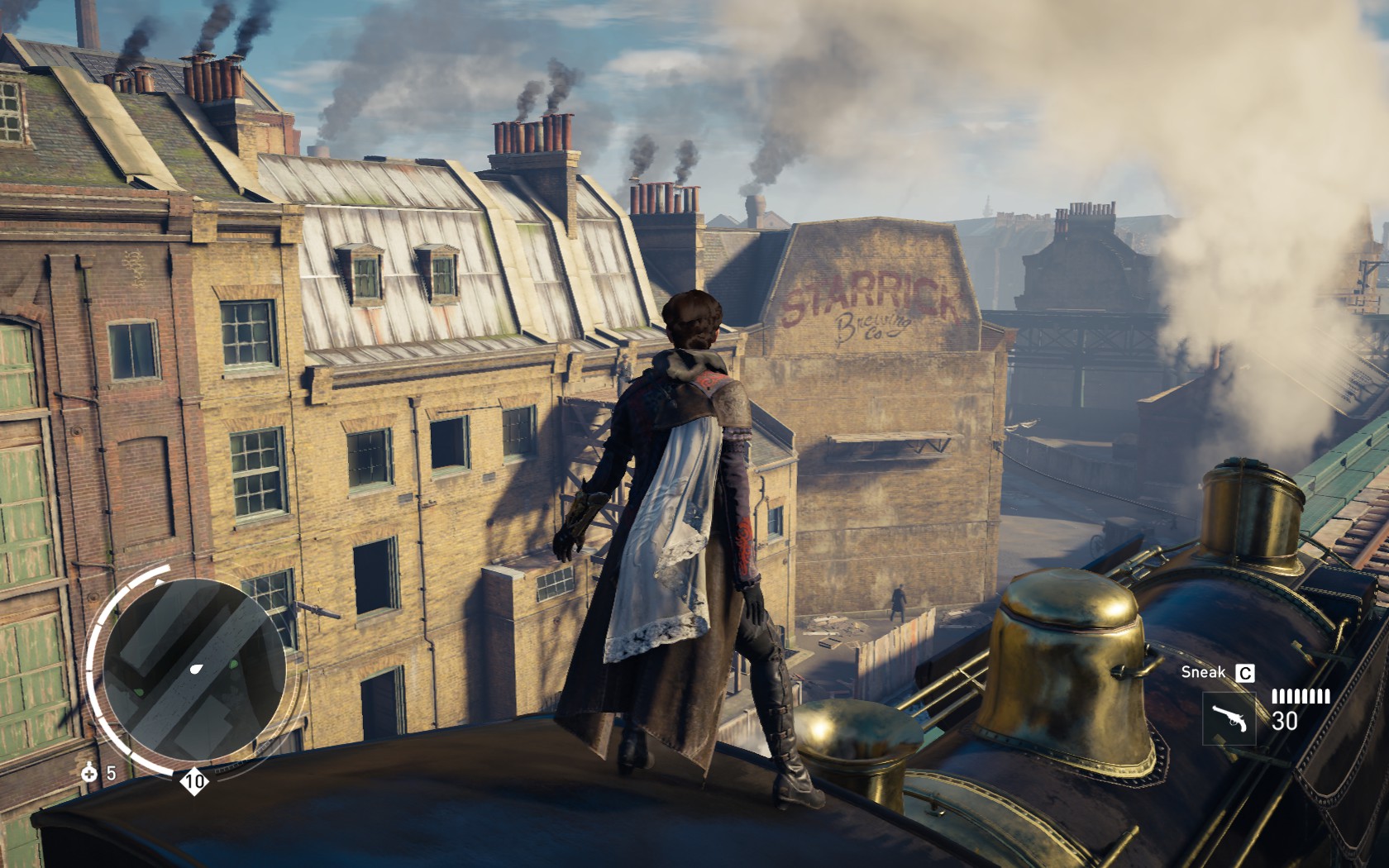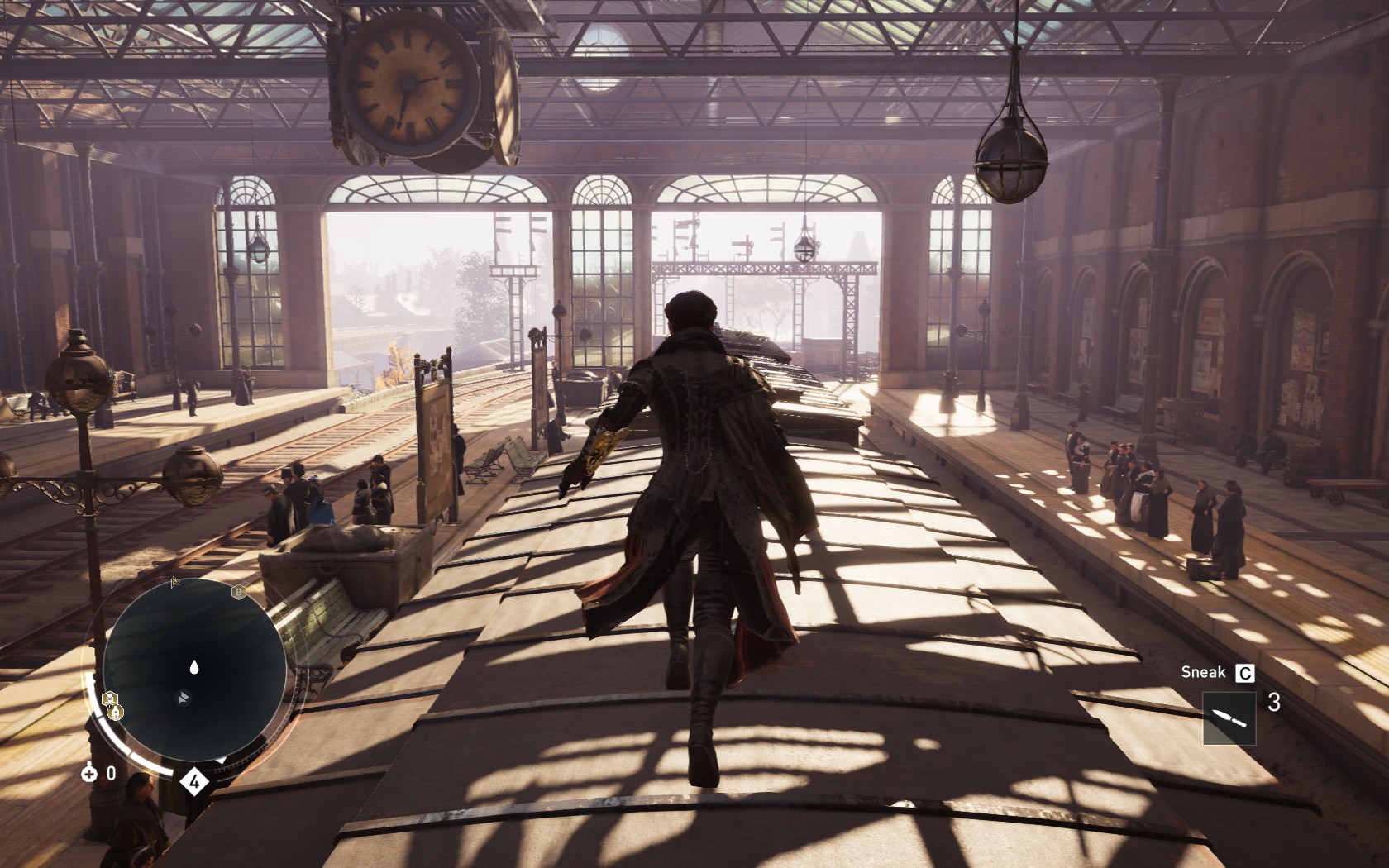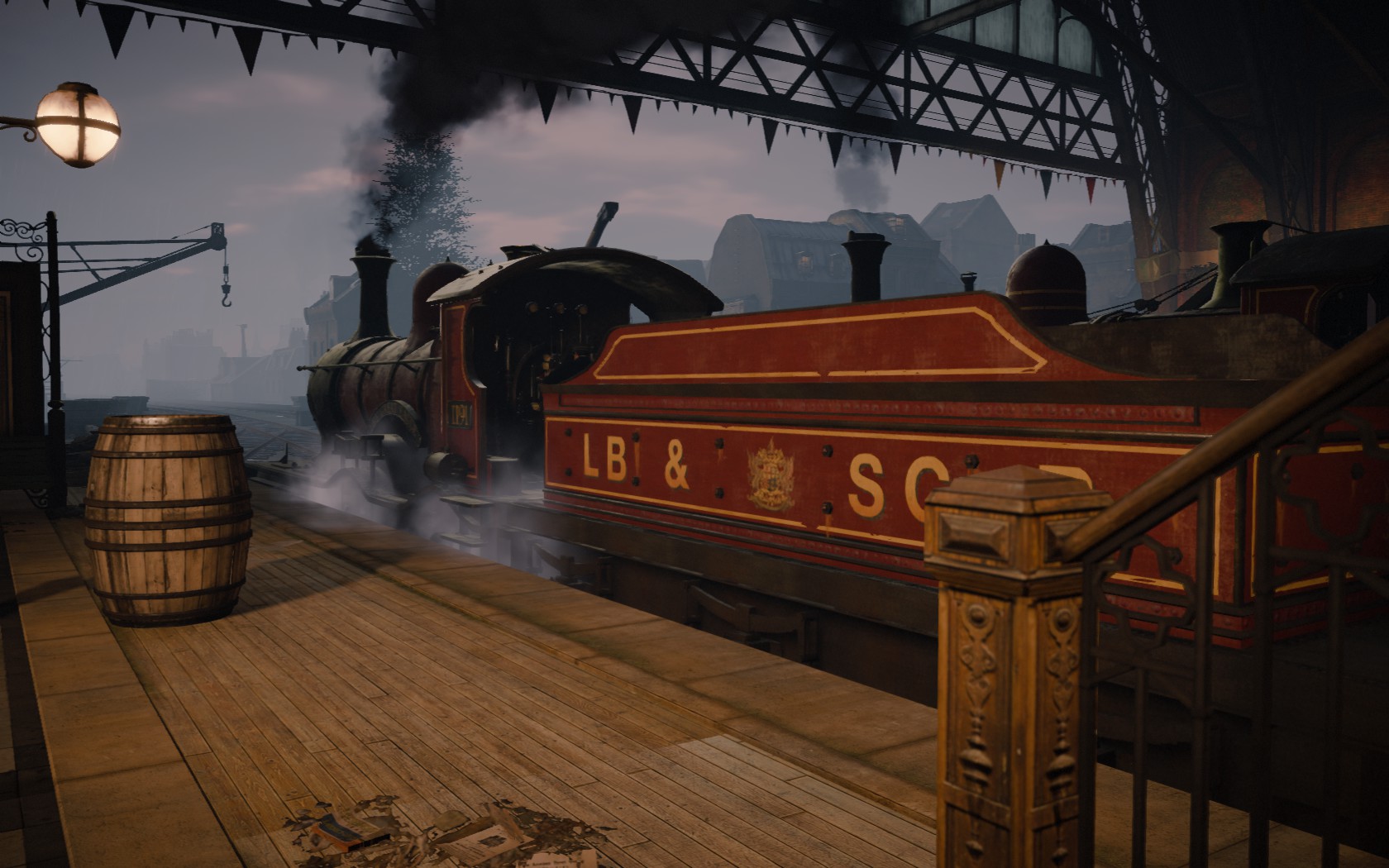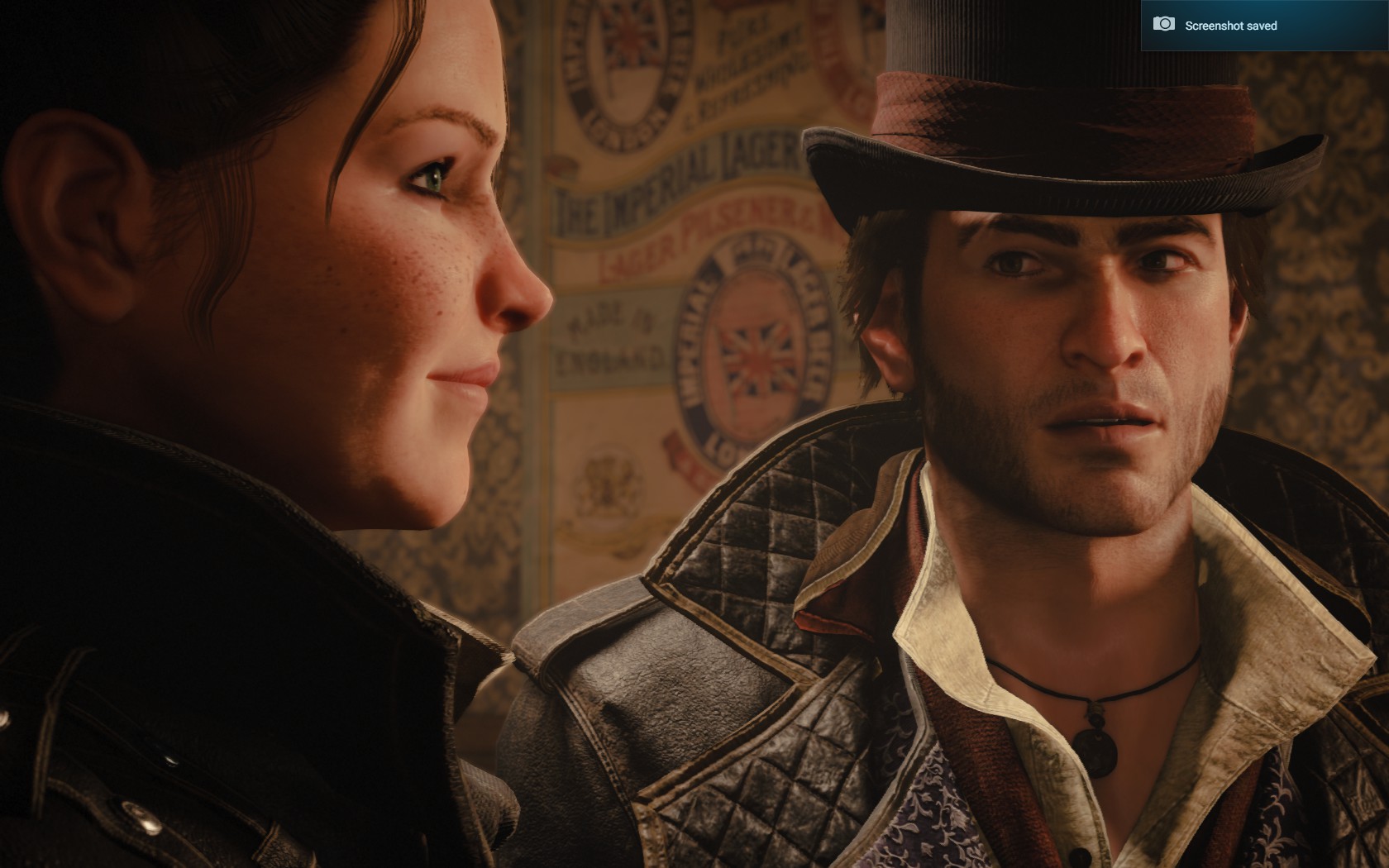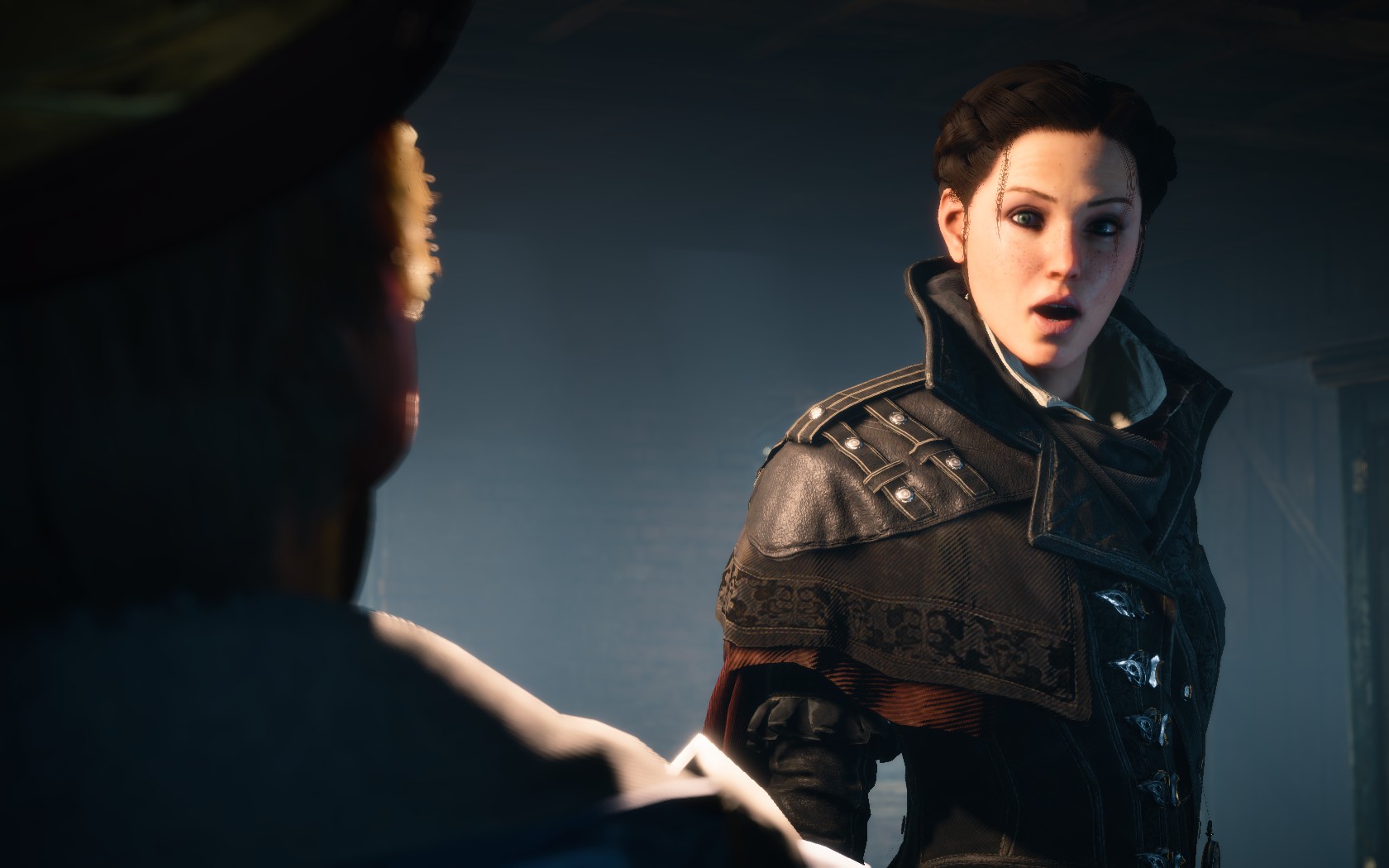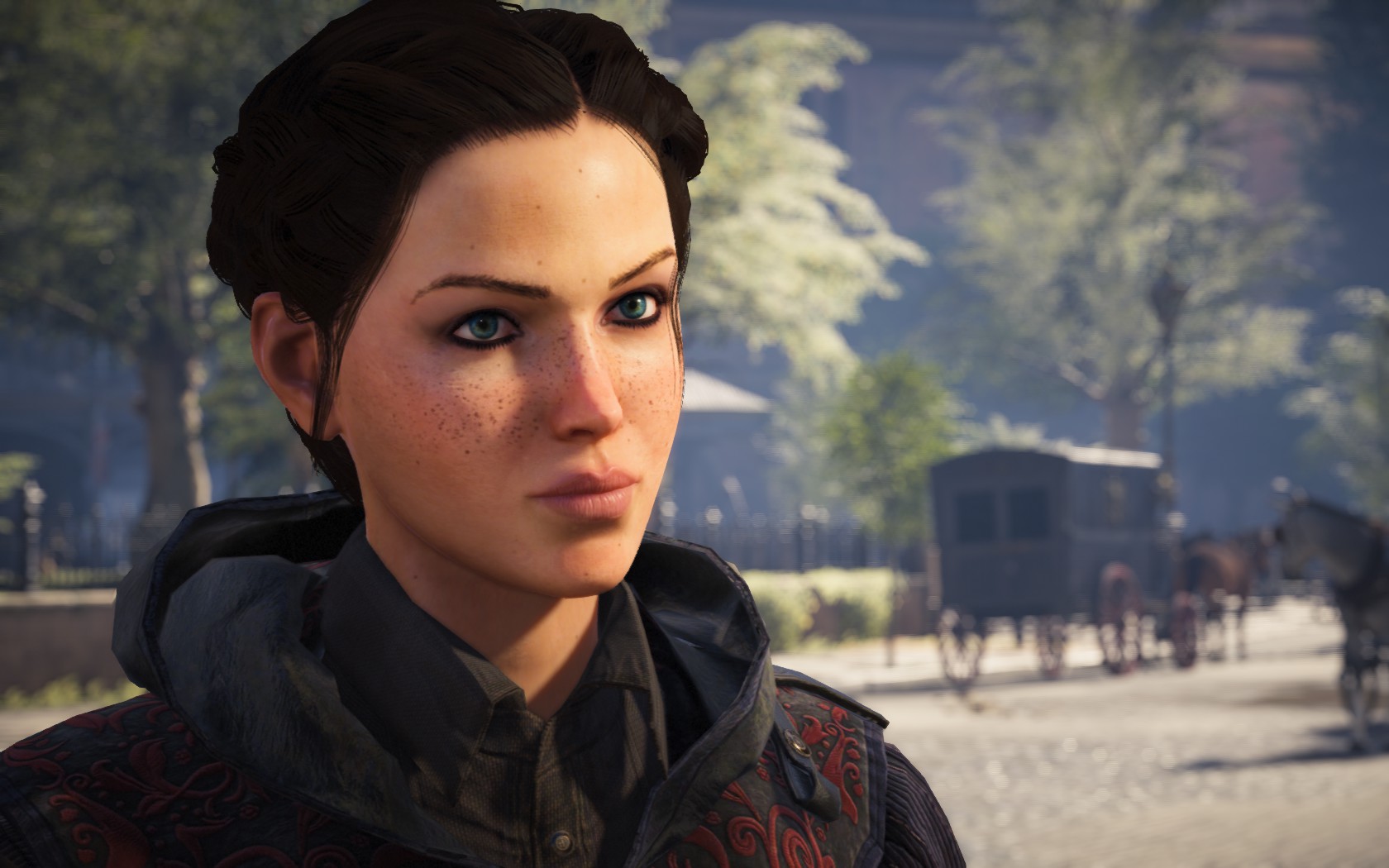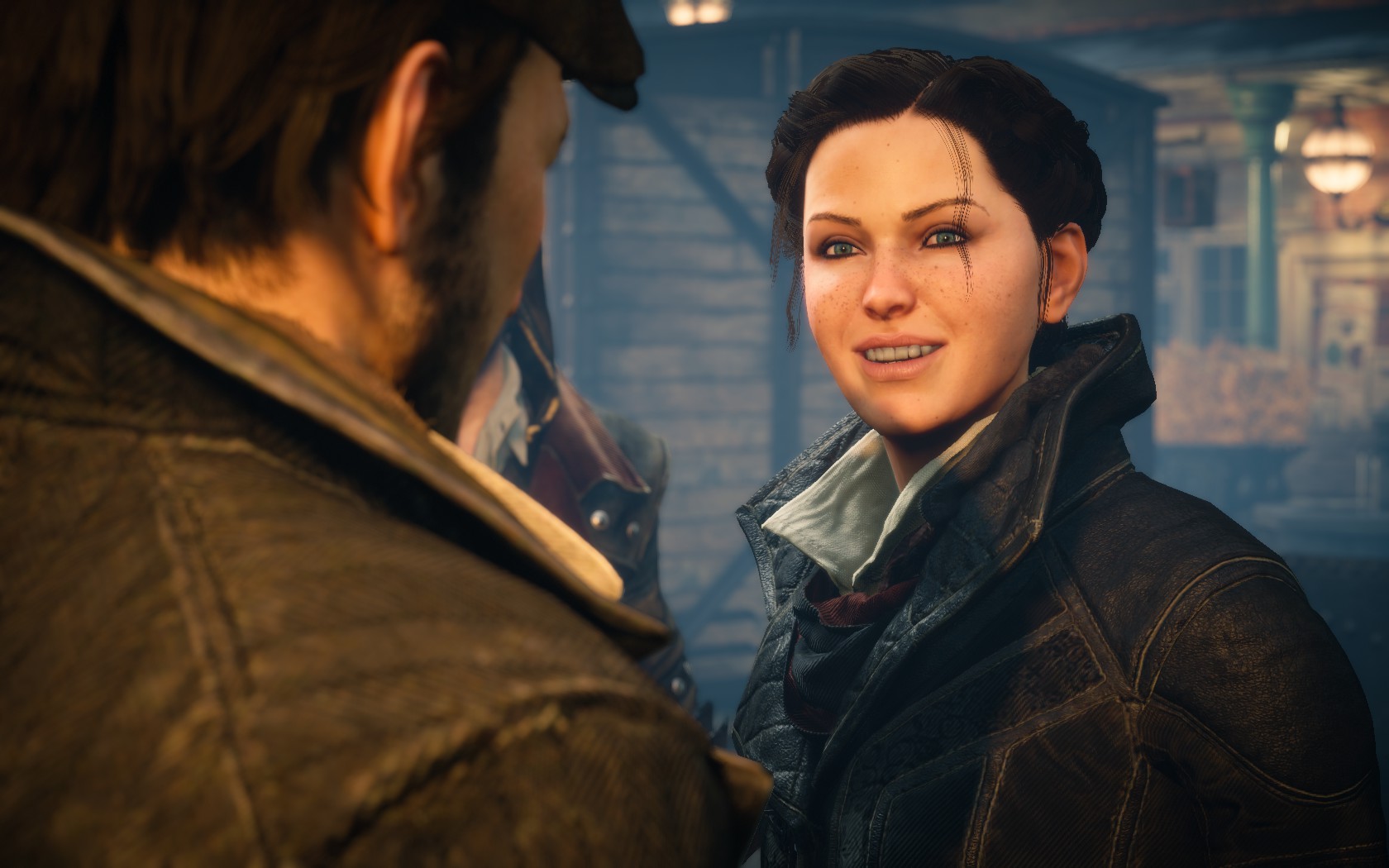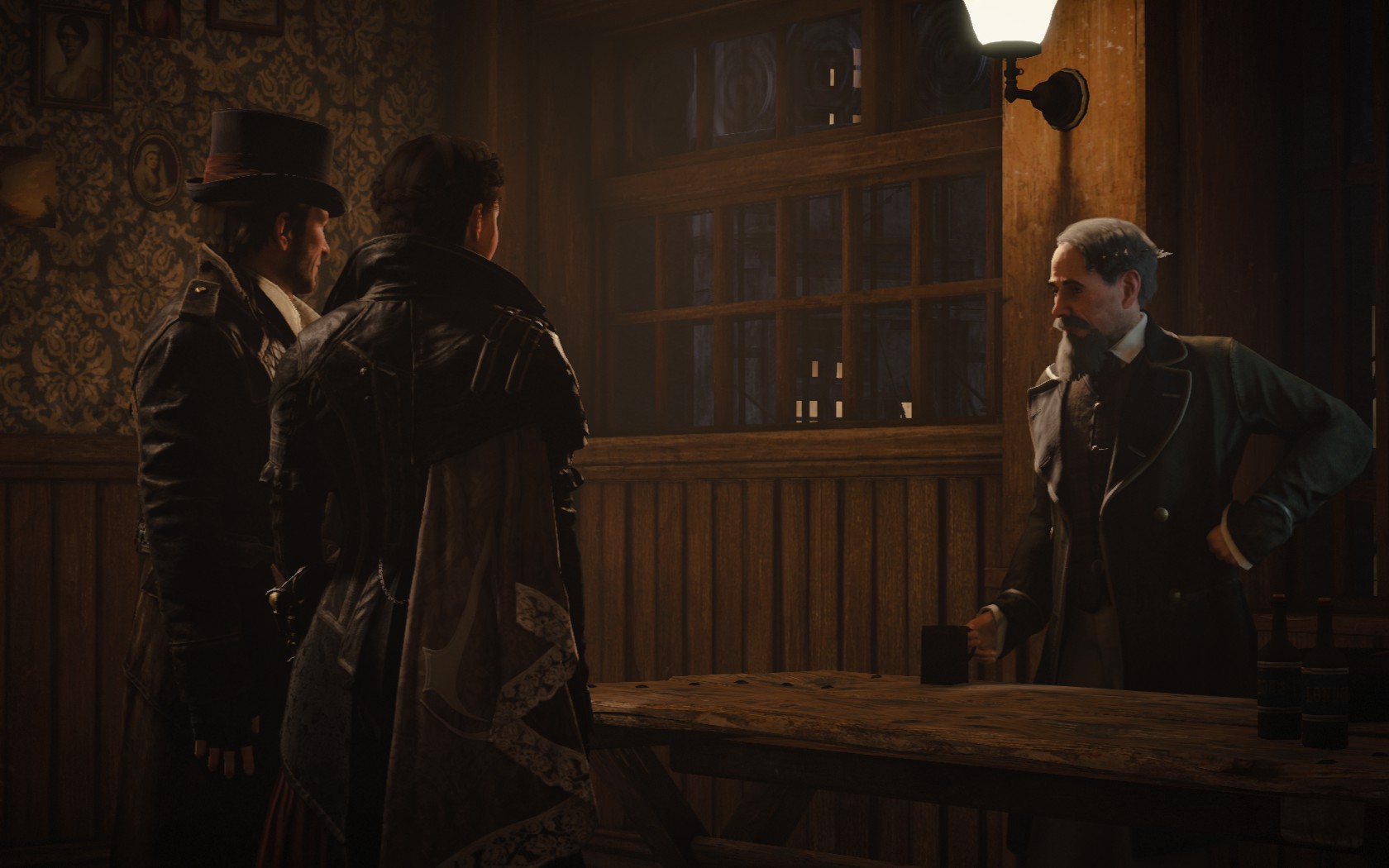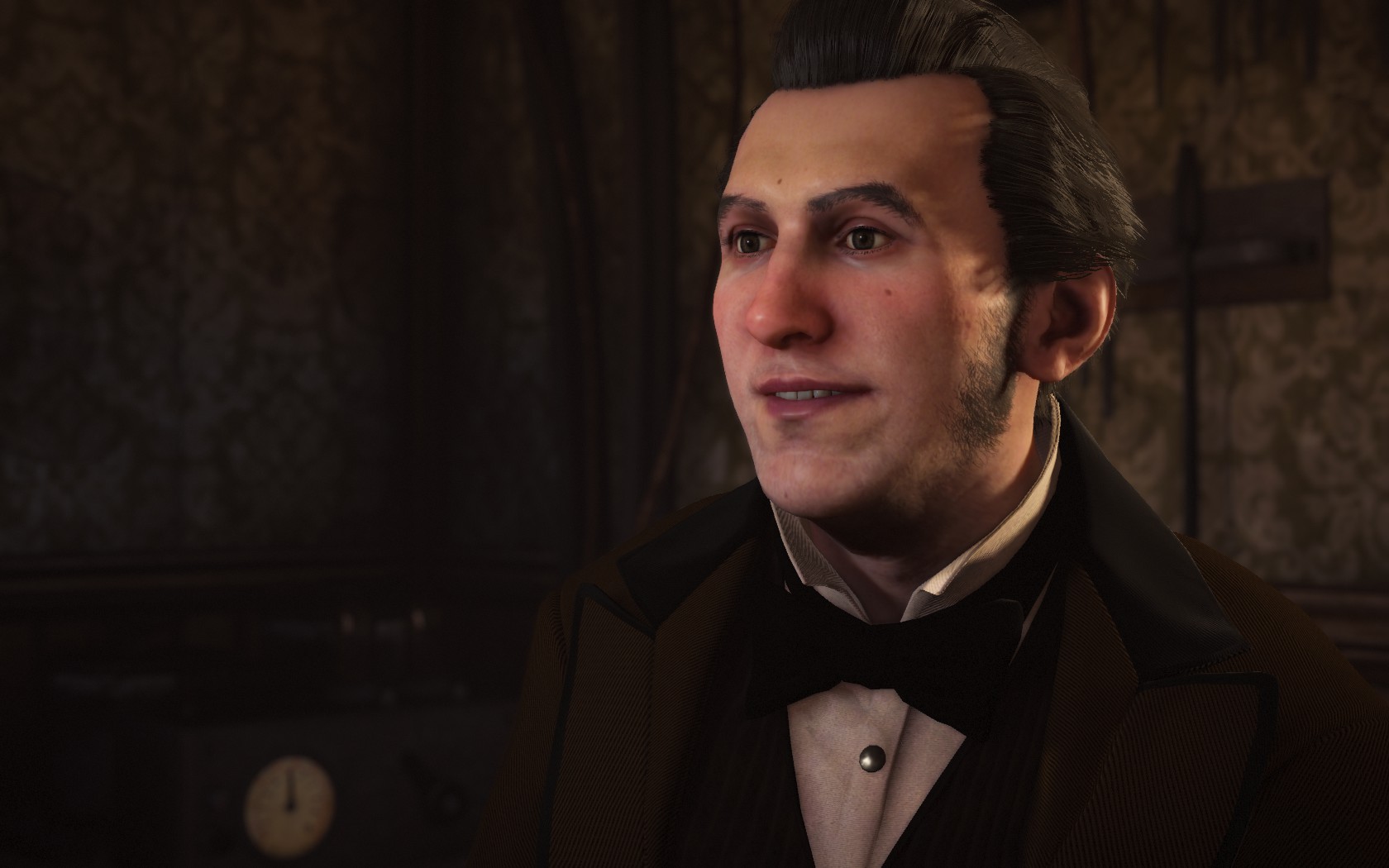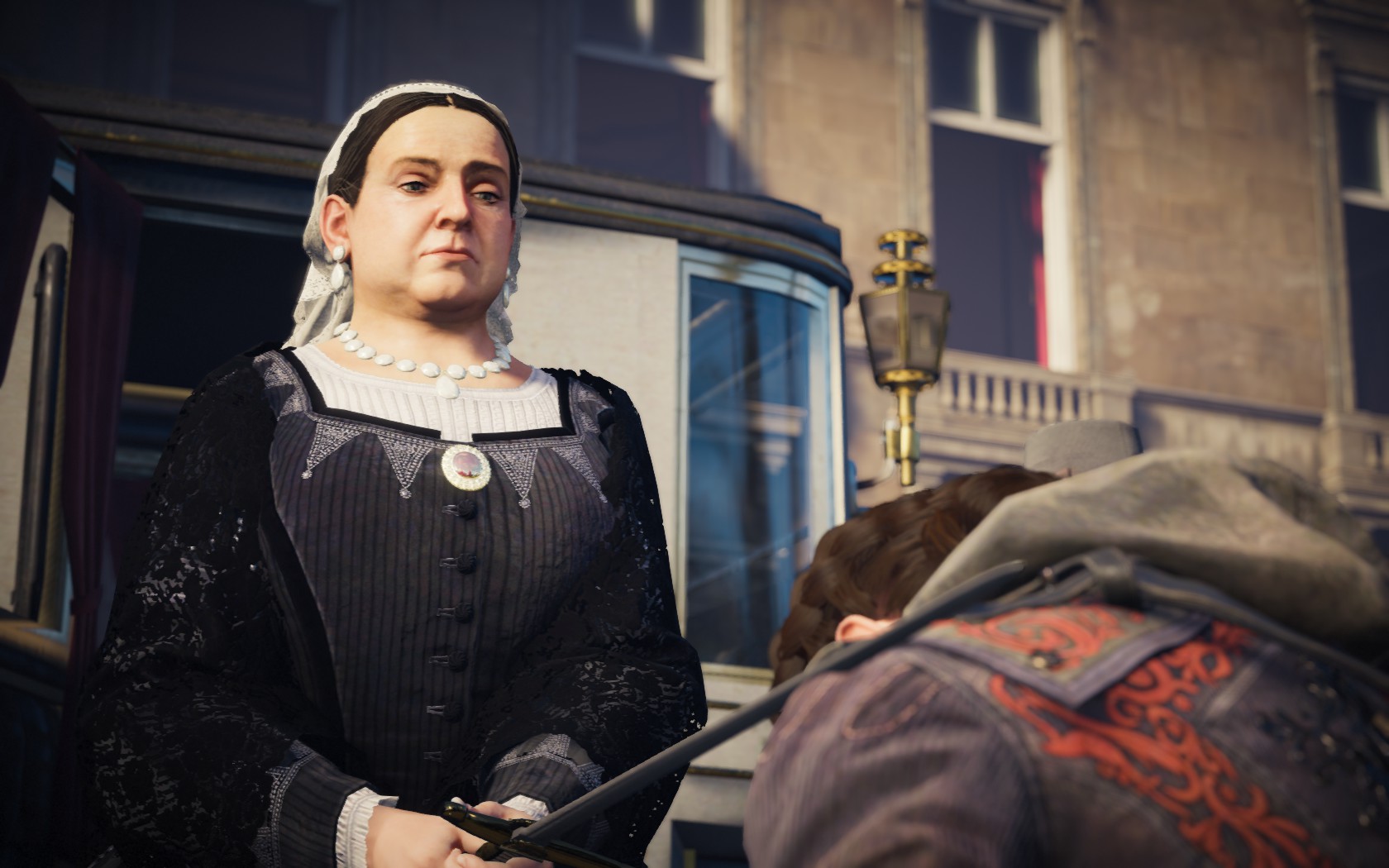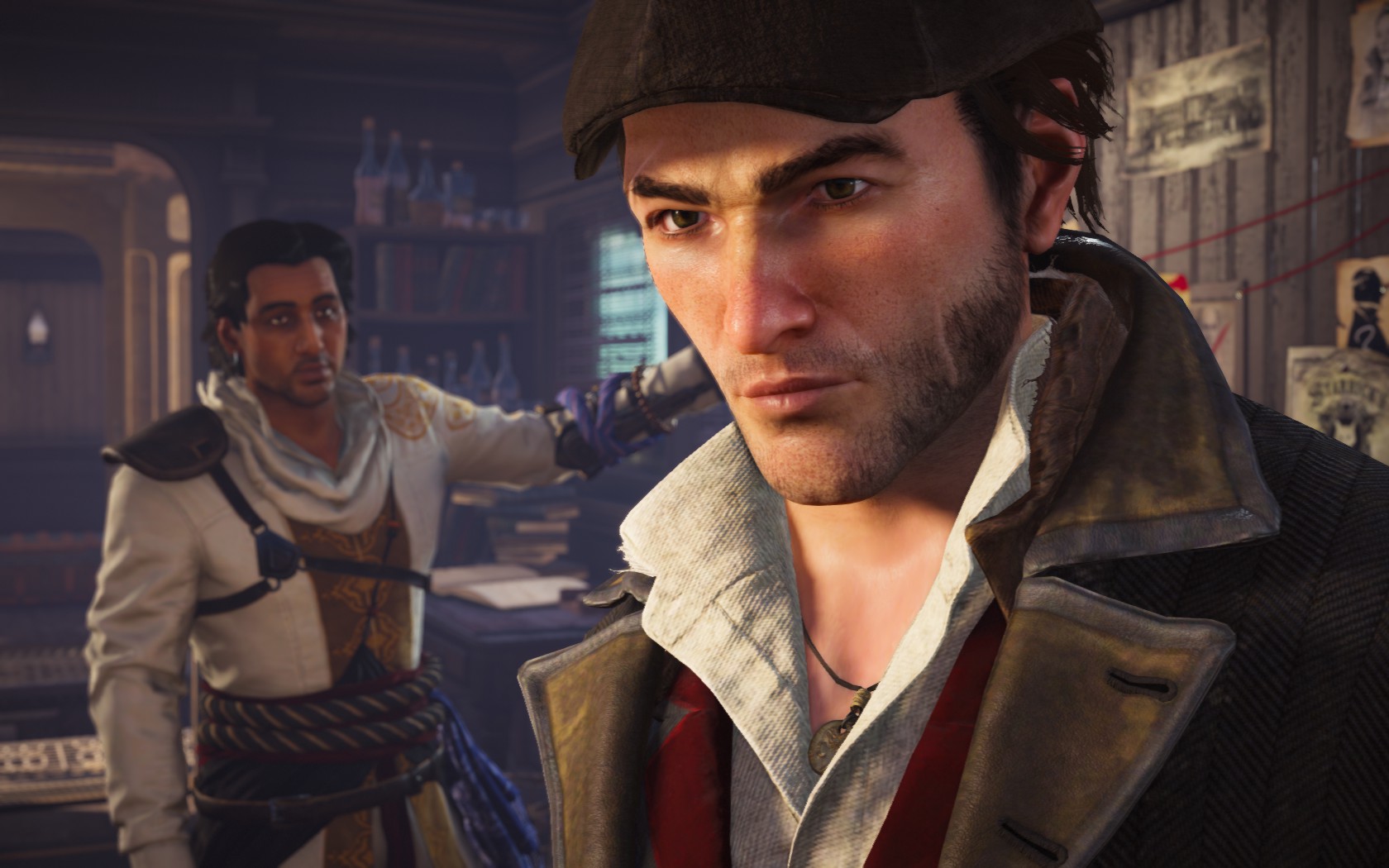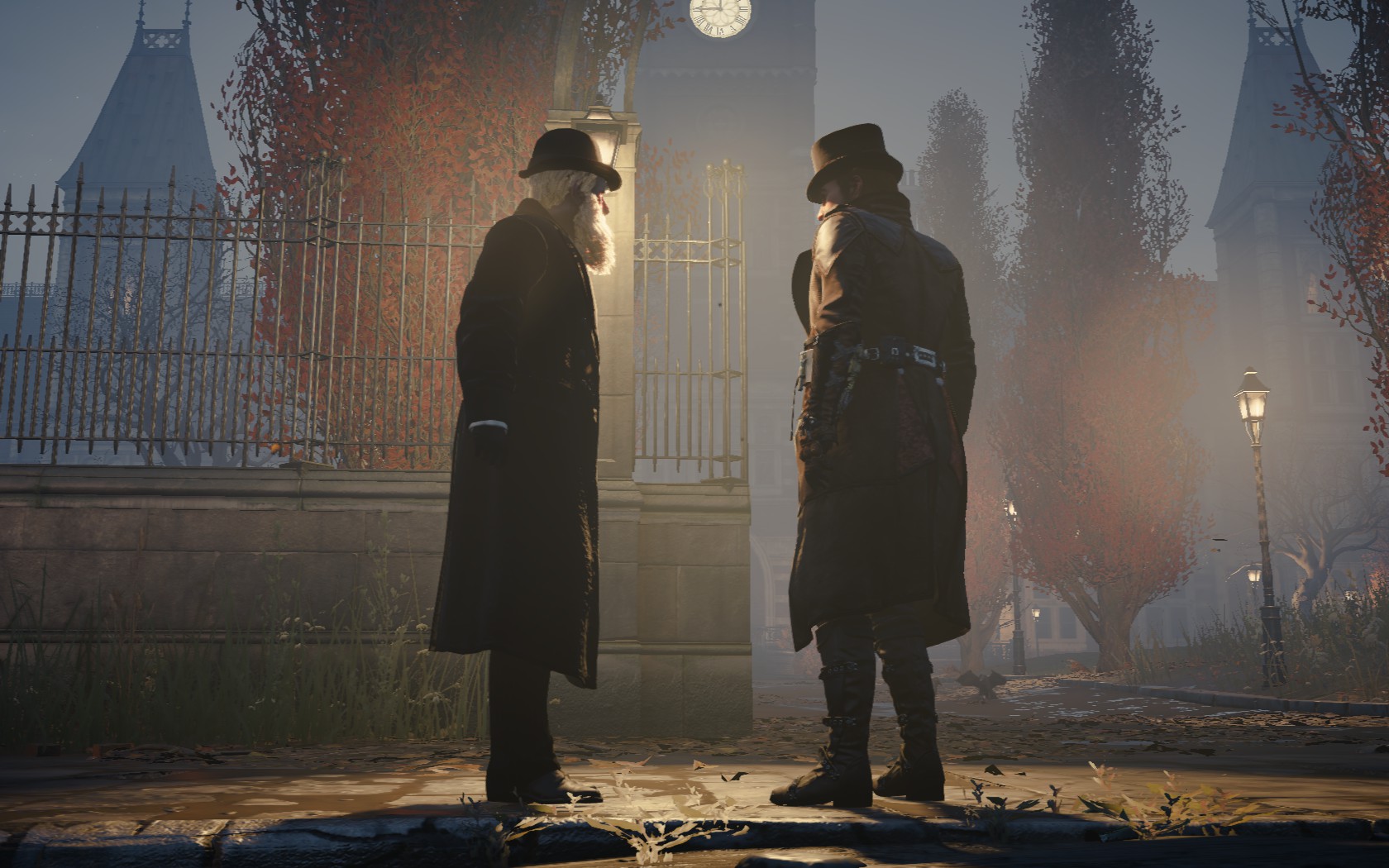A small introduction to Assassins Creed.
The Assassins Creed games stand out as one of my favourite series in gaming history and so far I've managed to get a 100% sync on each game. For those who have never played an AC game you are tasked with entering your ancestors' past lives via a clever device called the Animus. This nifty bit of kit uses memories of past relatives locked deep within your DNA and then builds a virtual landscape from the source material allowing you to re-live memories past: this could obviously lead to wealth and power for those who know where to look. This memory scavenging is all played through the overarching story of the Assassins versus the Templars - of course you align on the side of the Assassins - and while the majority of the game is played in the Animus in some games you can leave the virtual world for the present day. Here, some would say, are the weakest areas of the AC games but if nothing else it adds an extra layer and also helps conclude the story of Desmond (the modern day descendent of the first three games' Assassins).
There is a good degree of freedom in these memories to explore the environment and soak up the atmosphere. It's one of those genius situations which really lets the developer make up their own rules because, like the Matrix, this world is a realistic simulation based on a set of rules - but you are still within the confines of a digital memory and so the boundaries you hit represent this. It is never really explained why in previous titles you can build (or renovate) whole city districts but like with many games we have to accept a little bit of creative freedom.
As I began to pen ideas for an AC review I started to think back over all the splendiferous places I'd visited (and climbed all over) while leading the life of an assassin: the Third Crusade fighting the Knights Templars, San Gimignano, Venice, Florence, Forlì and the Tuscan countryside, Rome, Constantinople and so on - an incredible journey; working alongside Leonardo Da Vinci to develop new weapons and even testing out his famous flying machine was a real stand-out moment; and in Black Flag the open ocean became a living breathing thing as I took the role of Edward Kenway and set sail in what was arguably one of the most impressive pirate simulations ever seen while still sticking faithfully to the tenets of the series. To put it simply, the AC games are a stunningly realised romp across our history and for this reason alone I see the series as such an important one. The sheer amount of detail lavished on to every city, fort and market place is breathtaking. The team who develop these levels do an astounding amount of historical research in order to get it looking and feeling this authentic. However, it is not just how they look but how they move and mesh together making the city seem to come alive before you.
Then came the dark days of Unity - you could ask any fan of the series what they thought and most would give a brief chuckle and tell you their own account of the widely reported graphical problems and bugs. The game's performance was also notoriously poor across all systems but in particular on PC - in short Unity was a disaster for Ubisoft and it is a shame because despite the technical problems there were some beautiful and well thought out elements to the game. I didn't particularly like the main assassin but I did love the new method by which assassins could now descend as ably as they have scurried up walls throughout the series.
All images beyonf this point are from my own game.
Welcome to London guvnor.
I've seen many cities in my life but the one that always stands out is London. I'm biased of course being British but there is no denying it has got its own very distinct character. I now live in sunny Manchester but for a few years I did work in London and spent many a day roaming the streets of London and standing in awe of its many sights. Not just the obvious ones like Big Ben and the Palace but where London really gets interesting is when you walk off the beaten track and absorb some of the historical ambience that pours from every nook and cranny, it seems like every street has a story to tell. I have also always loved learning about the industrial revolution and find this period of time fascinating - so you can imagine how thrilled I am to now be playing an AC game, not only in London, but set smack bang in the middle of this industrial age.
This is the story of Evie and Jacob Frye, two young assassin siblings who have set their eyes on London which is currently in the control of a ruthless Templar known as Crawford Starrick. The first thing you should know about this game is that Ubisoft have done an outstanding job of recreating an industrial London and for this alone they deserve high praise. There are a few hiccups here and there which I will go into but when you consider the scale and ambition of this game world I would frankly be amazed if there weren't some technical problems.
Sky Line
As the wide open streets and spaces of London have been faithfully recreated this means that this city looks and feels very different from many of the tightly packed cities before with their narrow streets and warren-like alleyways. To combat this obvious difference the developers added a device that fires a zip line from where you are to another distant point then allowing Evie or Jacob to pull themselves across: this can be inclined up or down and can even be fired directly skyward to rapidly ascend a building or monument in seconds. So, when I first read about this new feature I hated the idea and was convinced they had ruined something I hold dear about the series; I now stand corrected and realise this new piece of kit fits the city of London like a glove. My main concern was the amazing (if sometimes wonky) parkour being replaced with a button press and in a way it has been but it's clear to me now that without the options the line launcher presents traversing London would have become very tedious very fast. Indeed I can now not only scale the meticulously recreated monuments and buildings but also soar between them and just enjoy looking at the spectacle of Old London.
The location and design of the assassins' HQ in each game is becoming more interesting with each one but the base of operations in Syndicate is off the fucking chain. A train? are you kidding me?! I love it and while this may be in part more to do with the fact that I adore old steam trains, it also stands up as its own concept. For a start it moves around the city in real time, pulling into the various stations and chugging through the deep brick canyons as you approach main stations or trundling over bridges that span famous icons such as the Thames and Houses of Parliament. As I will go into in more detail, it's also great how you can just hop on or off whenever you see it.
Rinse and repeat.
Like most things in life you can have too much of a good thing and over the last few years the AC games have been getting increased criticism for bringing the same formula to the table and not enough innovation. It's a difficult one because if you stray too far from what made the series popular in the first place developers run the risk of alienating long time fans. The huge crowds and ultra realistic environments of Unity may have been the main reason Ubisoft overreached in the search for pushing AC games forwards.
You could say the basic idea hasn't changed: you unlock areas of the city by 'syncing' with vantage points. As you might imagine your ultimate goal is to assassinate various targets through various guises of circumstance and it's here the games have received the most criticism. As most games make the 'boss fights' the peak in difficulty for that area AC has always recognised that no matter how cretinous or powerful a target is, he is still just a man. This situation has become far better as the AC games have evolved by making the circumstances around the target something to beat, in essence the task of reaching the mark becomes the boss fight. In Syndicate you are presented with a target and then a few other options such as 'additional target' or 'unique kill' opportunity. While it's not as dynamic as some of the Hitman games these assassination levels are well presented but I still feel that, because assassination should be the apex of the experience, more work could be done to make these sections better. As I will mention, I think if indoor sections continue to be fleshed out so to should the stealth and cover systems as right now they are lagging behind.
As the AC games have evolved most of the game mechanics have become refined, tighter and in some cases disappeared. It could be said the ridable horses that occupied the first few games were the best looking horses in any game ever (maybe barring MGS5 the Witcher 3). We've also seen some pretty advanced city development through the recent games as well as various ways to build up your ranks of Assassins in the excellent Brotherhood. These and many more have come and gone as the setting has changed. I personally would have loved to be able to ride a horse in the London streets and felt that the open spaces would have been big enough to accommodate it. The AC games have always had their problems and I do recognise that, if the series is to shed this perception each game is more of the same it needs to take more time to eradicate the bugs and also push it's strengths in new directions.
Core game mechanics
The first thing that jumps out at me is that the combat has been given a bit of an overhaul: Evie and Jacob both have wrist blades but also have their own combat styles and weapons. Jacob favours a short blade or knuckle duster where Evie shows off her agility with a cane sword. It just depends on what you like but make no mistake these two deadly assassins attack with a speed and brutality we've not seen before. There are times when Evie especially has done enough to incapacitate her foe but then carries on hammering away with lethal strikes and bone breaking moves - in one awesome scene she even says 'I never liked balls'.. There are a range of skills to upgrade and for the most part both brother and sister play the same but Evie has more of an affinity with throwing knives and stealth: she can even appear invisible later on which may be just a bit too much for some. Jacob is more brash and is all about hitting his enemies head on with a higher health pool and more mass combat appeal. I personally would have liked more unique skills to justify two separate skill trees but this is a personal preference.
The all important parkour which is the series' signature feature has been refined a good deal from Unity so a lot of the cool ways your character will use his/her momentum and spin down to the ground have carried over but many (not all) of the janky controls have been improved to feel much tighter: vaulting into open windows is now as easy as pie. I often found myself moving from the zip line, dropping on to a boat or carriage, then hopping to another, and so on - the speed at which I can transition from one place to another feels so fast and responsive. In short, I feel like I can go anywhere in this world and that is by far one of the best aspects of this series for me. The stealth however seems to have taken a step back from Unity because we can no longer tell the UI where we want it to lock into a piece of cover; now we approach cover and just hope to god we lock into it. Sometimes it works and sometimes it doesn't and for a game that works around being stealthy this is a problem and I feel it's time Ubisoft innovated this area of the formula.
As for kit, we have a similar set up to previous games but in this game you can engage in a rudimentary crafting system which is fuelled by just playing the game. All items once crafted/acquired can then be upgraded - it does the job and adds another layer of progression, albeit a light one. I just wish the statistics that improve with each upgrade displayed a more obvious advantage because if I'm honest killing people at the start of the game compared to the end felt pretty much the same, as did the ability of enemies to detect you. There are also specialist items required for some craftables but again these are acquired in the general playing of the missions and opening gold chests. There are also the usual ocean of collectables AC games are know for and while it's all optional I do like how these are once again themed to London: i.e. varied beers and pressed flowers. Some people will spend time collecting them and others will find this side of things an unnecessary waste of time.
There are a litany of activities to get lost in: from train robberies, sabotage missions on the Thames, hijacking carriages run by the enemy gangs, organised fist fights and carriage races - as well as many random encounters such as pickpockets and criminals. Each borough is split up into smaller sections and will have its own mission type; these range from liberating children from brutal mill owners (only to then work in your own mill mind), taking out Templar officials or even kidnapping them for the police to deal with. Once all the sections have been beaten you then have a gang fight with the local gang leader, these are fairly basic affairs and the gang leaders don't really offer much of a challenge. Again I feel if we saw some progress in how assassins take on more formidable enemies we could apply this to the wider game.
For the most part you can play as either Evie or Jacob and each has their own icons on the game map. I found Evie far more enjoyable to play which and it's a shame then that towards the second half of the game Jacob takes more of a central role. I do think it was also a wasted opportunity that both main characters spend the playable parts of the game separate; yes the story supports this to an extent because both have their own sub agendas but still - GTA5 did show it's possible to have good multi character missions. Ubisoft - if you ever read this please, now we've had a proof of concept, can we now have Evie in her own game?
The sound and music in this game are excellent and well considered throughout. Like many games now game music will rise and fall in intensity depending on what is happening on the screen. From the subtle to the dramatic, I'm no expert on music but the way the violin playfully dances in the background makes me think about the many Sherlock Holmes films I've seen and thus I think the music does exactly what it should. It's a real treat to walk around the city and just listen; from the chimes of Big Ben in the distance, the clatter of carriages passing by to the cuckoo sound on a cool sunny morning walking through a church yard. It's hard not to be impressed and yes I'll admit that these things are not gameplay - but I really do enjoy the atmosphere they build and so consider it a tangible reason why I rate these games higher than some might.
Cheeky devils
As the AC games have scaled the ages we have stepped into the shoes of many assassins and while everyone will have their favourites, from what I've seen Ezio is one of the most popular - possibly in part due to an excellent story arc covering the transformation from young impetuous rebel to the old and wise predator he became. Ezio was also my favourite Assassin, that is until Evie came along - she is the bacon: quick-witted, enthusiastic, playful, confident and deadly. The acting quality in AC Syndicate in my opinion has reached new highs, the two actors that play Evie and Jacob (Victoria Atkin and Paul Amos respectively) have injected so much personality into these fictitious assassins it really is impossible not to love them. The playful banter between the two carries the thin and disappointing plot, which is a real shame because in past games the plot has taken many interesting twists and turns: in Syndicate it just never came.
The many faces of Evie Frye
There are some very famous historical figures who pop up in this version of London and I have to take my hat off to the developers here because for the most part they are also very well acted and portrayed doing what they were famous for. Florence Nightingale helps you save the young children you befriend, biologist Charles Darwin no less and celebrated novelist Charles Dickens also have a substantial presence in the game. Alexander Graham Bell, the famous inventor, also steps in to assist Evie and Jacob in fixing their line launcher and then goes onto provide further new toys very much in the same way Leonardo DaVinci did with Ezio. Karl Marx asks for your aid to better the working rights and conditions of workers who were well known to live and die in the harsh factories and mills of the industrial London. Someone else who comes to the aid of Evie and Jacobs cause is the police sergeant Frederick Abberline who famously investigated Jack the Ripper. Hell, even Queen Victoria steals the limelight for a few choice scenes!
I have to say that while I won't go into the main plot line for the sake of spoilers I was disappointed with the main story, its main villain and the end sequence. To be fair, the plot does follow with the setting and theme of London but damn it, I did expect a few surprises - alas there were none. Crawford Starrick seems almost absent for most parts of the game, sat in his office having a tantrum every time you dispatch one of his allies. He also falls into the trappings of a cookie cutter bad guy, feigning despondence and acting like your actions are all in vain compared to his master plan. It's not that he is badly acted or animated - on the contrary, the acting is spot on - but he just felt like an absentee villain that was never really used much other than to link each sequence together. Maybe this was intentional but it would have been great to see him out in the wider game world acting as an enabler for your own quest.
A breach in reality.
It is really strange seeing London in a game. Apart from a brief visit to Rome, the City of London is the first time I've been able to see how the digital city Ubisoft have created tallies with my own memories. Obviously London has changed a little since the days of Evie and Jacob but much has not and places like Nelson's Column towering outside the National Gallery look startlingly close to the real thing. Seeing the train stations for the first time was also very visceral and pleasing because, despite the modern skin they now wear, the size and presence of them is also the same. Another vista that caught me off guard was seeing Big Ben lit up at night and then the rising sun illuminates the city's rooftops and you see the Houses of Parliament emerging from the morning fog (smog) which was infamous on the Thames due to heavy pollution - sublime.
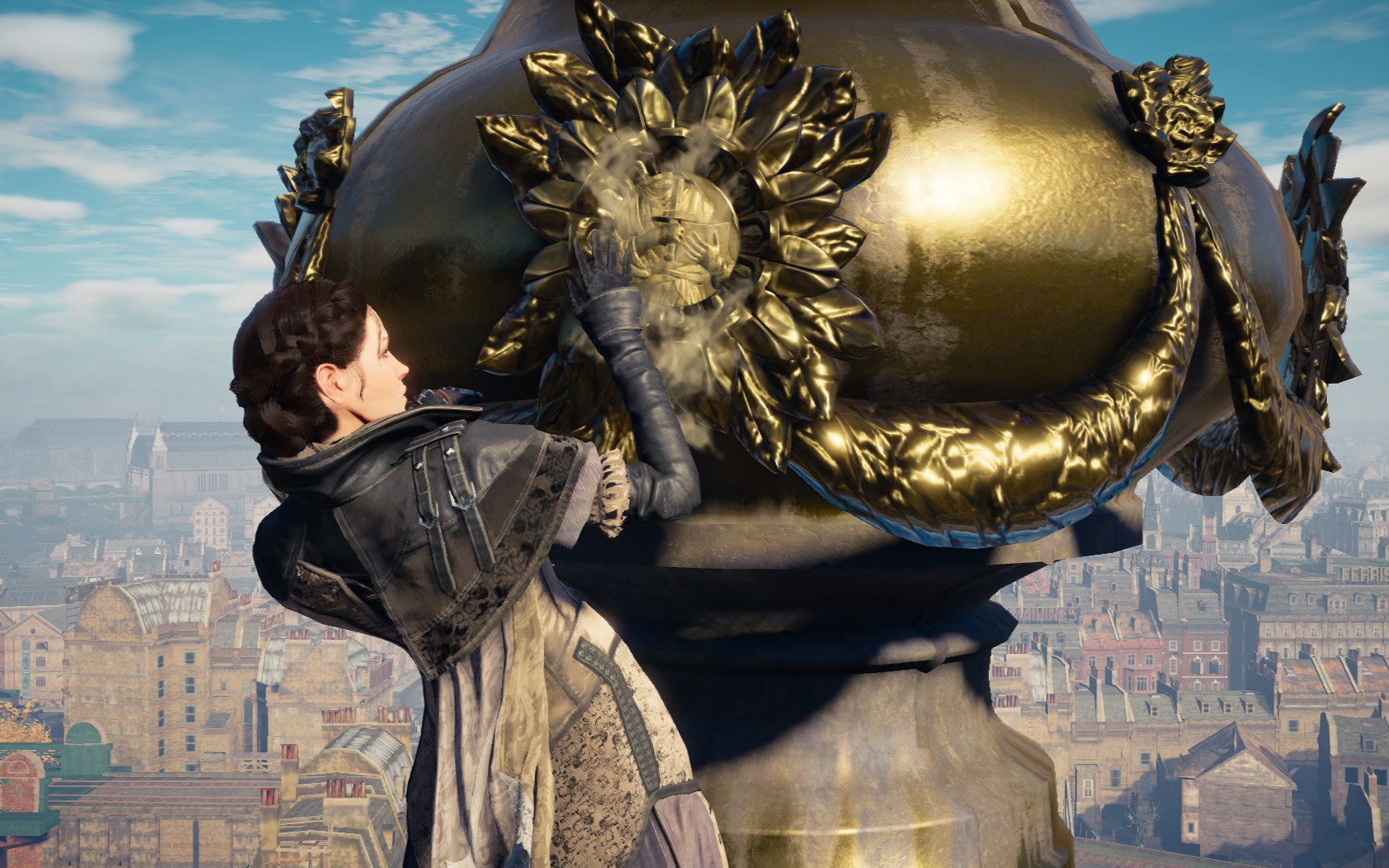
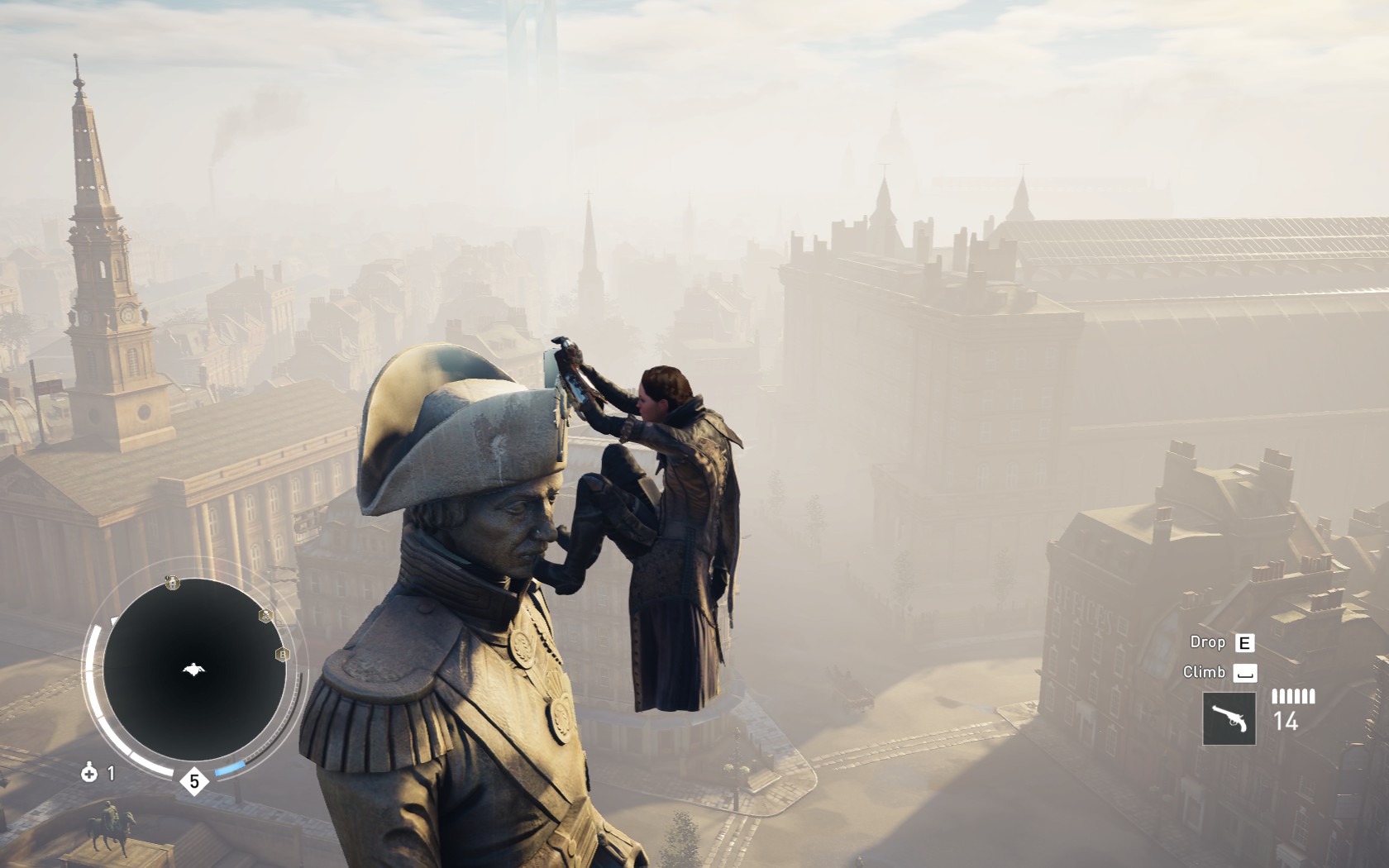
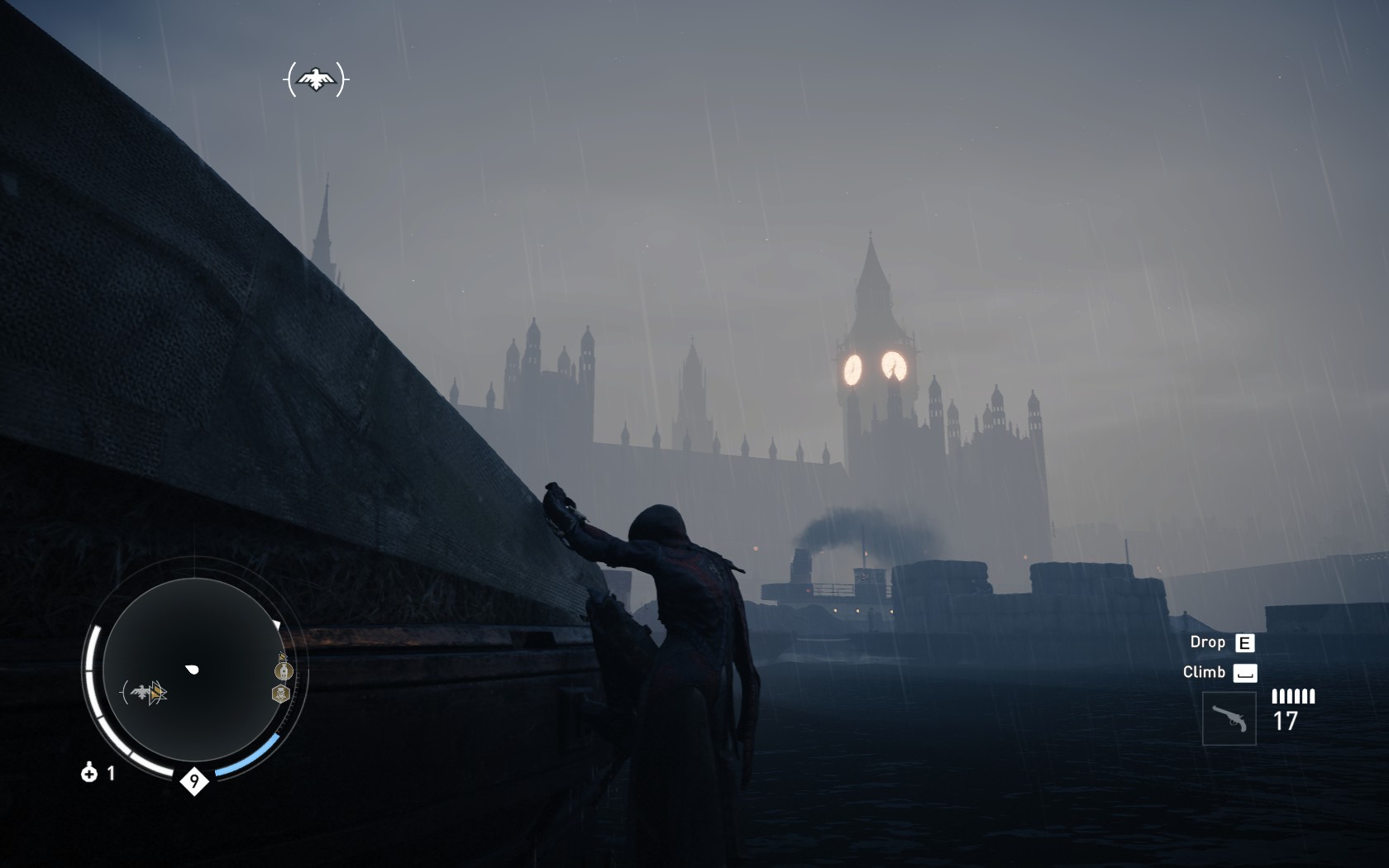
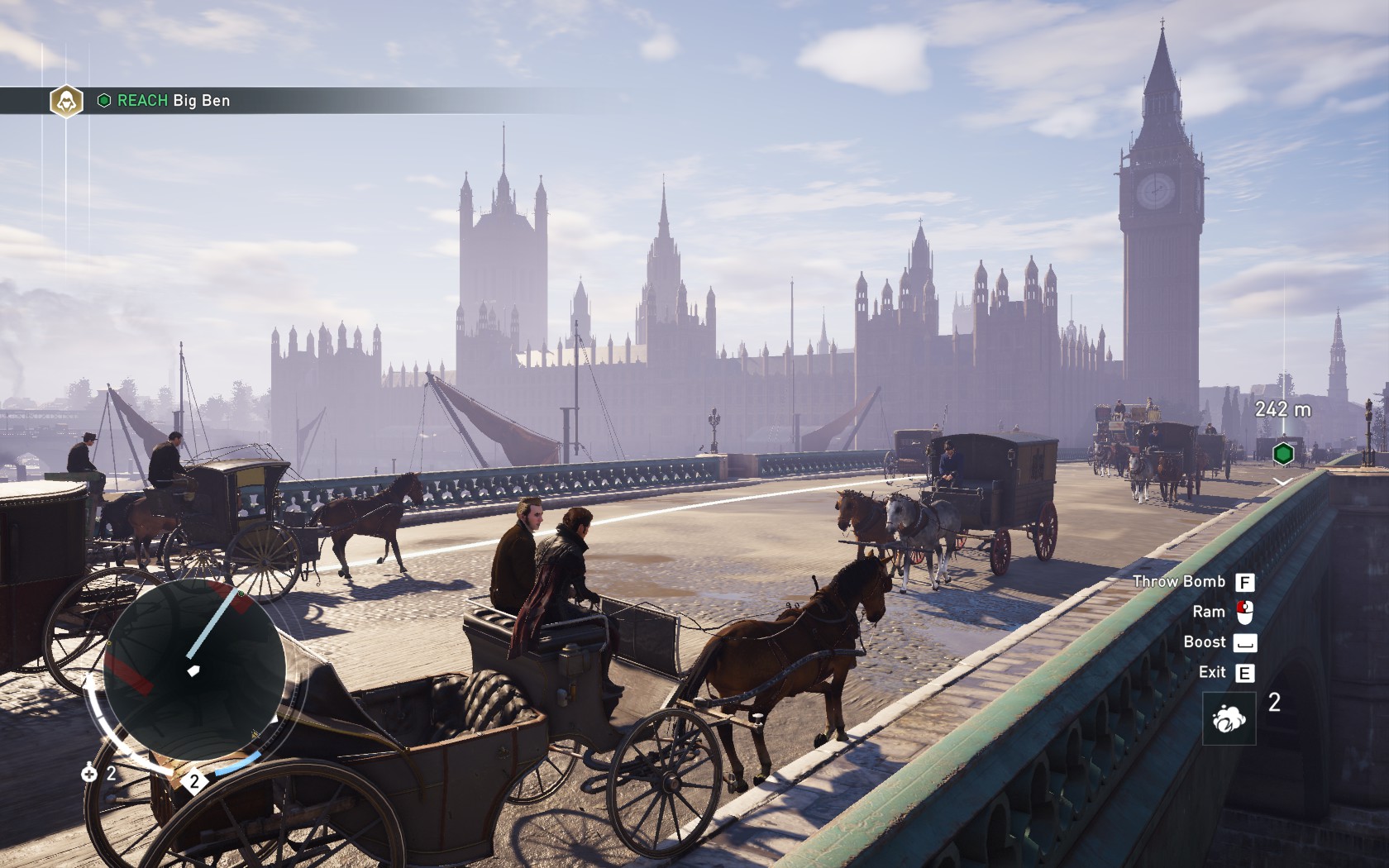
Ah yes, the Thames, the life blood of London - cutting the city clean in half and as much of a character as any of the other sights you will gaze upon. Again, Ubisoft have really captured the famous river in all its overcrowded and bustling glory. Barges and freight chug back and forth at a surprising pace leaving huge waves of sewage and waste-infused water in their wake. What is just awesome is how you can jump from boat to boat like some kind of assassin esk frogger. There are even boats to raid for side missions to earn cash and XP. Some of the bigger boats have masts which, like in Black Flag, can be scaled and clambered up and down: now of course you can zip between them with your new line launcher. So this is yet another aspect of London that has been recreated and then made interactive (like the trains and carriages).
Is it PC?
So the first question most PC gamers asked was this: 'is it a Unity?' I think for most players the answer to this question is thankfully a no but that's not to say they are no problems. No matter how well a game runs on PC there will always be forum posts by gamers who have a far higher perception of how powerful their rig actually is - such is the way of PC gaming. The bottom line is that Syndicate runs a hell of a lot better than Unity did when it fist landed but it is still not a well-optimised game. After a year of patches and refinement, if you do play Unity now it's actually running ok so I have hopes that Ubisoft will carry on working out the kinks and help Syndicate run better on more machines. I personally have a 4GHZ CPU overclocked to 4.4GHZ, with 16GB of DDR3 ram and a 980GTX: I am also running on Windows 7 and have the game installed on my SSD which I would recommend all PC gamers do if they can. With my system I was able to play with all settings on Ultra but had to tone down the shadows a notch to get a decent frame rate.
I have also come across some bizarre graphical glitches from Charles Darwin's head detaching itself and doing a 180 (must be that evolution thing he keeps talking about) to carriages being catapulted miles up into the London sky. I also watched one young lad play football with his feet and ball about 2 foot under the ground.. clearly the mutants were around back then as well. It's a real shame because these visual props are exquisitely animated and so much work has clearly gone into it - to then have a silly thing like this happen seems criminal. These problems, along with many other control issues, have plagued the series from day dot but I accept them because the fact is these game worlds are so complex and interactive: you can bump into people and they will recoil and complain. The price for not having NPCs anchored down is that sometimes the games engine just loses its shit and starts doing random things but these are small superficial glitches which shouldn't stop you enjoying the game.
I did however come across a game breaking bug which took me a few hours to get past and that was shortly after starting sequence seven. I was trapped in an endless loading screen while transporting an NPC somewhere. The game would enter a loading screen when the NPC had finished talking and just jam up - another reason why I hate games with autosave. The only way to get past it was to race to the check point before the old bag stops talking, allowing me to continue my game. Bugs like this are not acceptable and should never get past testing, however it's now being widely reported and thus Ubisoft have said a fix is in the pipeline.
Summary
Ubisoft said a few years back that they had a virtually never-ending supply of ideas, or settings, for Assassins Creed and thus we should expect the games to keep coming out for the foreseeable future: as a huge fan this is more welcome news than not. However, I also know that if they slowed down a little gamers would maybe get a chance to breathe in between AC outings: it's not like we are short of games to play is it? I don't mind sharing with you guys that while the game really does set the series back on track (even if it's a familiar track) I personally felt a ebb of sadness seeing industrial London before my eyes. Why? It's difficult to explain but here goes: I feel like we are now getting so close to where the old world and present day collide that the ways of the Assassins (and indeed Templars) become something else, something less mysterious and enigmatic. I remember seeing the film Last Samurai and feeling a great well of sadness for those ancient warriors being gunned down by machine gun fire simply because technology had overtaken them: in a way this is how the assassins may end up in the modern world and I fear the game that puts them in a modern setting (as a full setting rather than the plot bookmark used in previous games).
However these thoughts and feeling are just that - the reality is that with Assassins Creed Syndicate the series got exactly the game it needed, a safe return to form and just in time. Yes there will still be an army of naysayers who cast any Assassins Creed down as more of the same and in a more general way Ubisoft have built a rod for their own back with the farce that was Watchdogs or the technical problems we saw with Unity. However, I would say to any of these gamers that they should cast aside their preconceptions and see Syndicate for what it does do well. This is beyond doubt the most realistic and sumptuous recreation of London that we have ever seen; add to that a far more solid game experience and tighter mechanics and things are looking pretty good. My modifiers are quite simple: if you have liked/loved the previous AC games you can't go wrong here; however, if games that employ the same mechanics throughout wear you down then maybe AC Syndicate isn't for you.
At the end of the day, if you are an Assassins Creed fan like me then you know what to expect before you open the box. For many Syndicate will feel like more of the same with too many repeatable systems, but as I always say - if you like biscuits you can never have too many biscuits. Syndicate takes the ambition of Unity and this time delivers: it presents us with central characters that make me care about them and, more than anything else, makes me very excited for the next chapter in the Assassins Creed saga.





